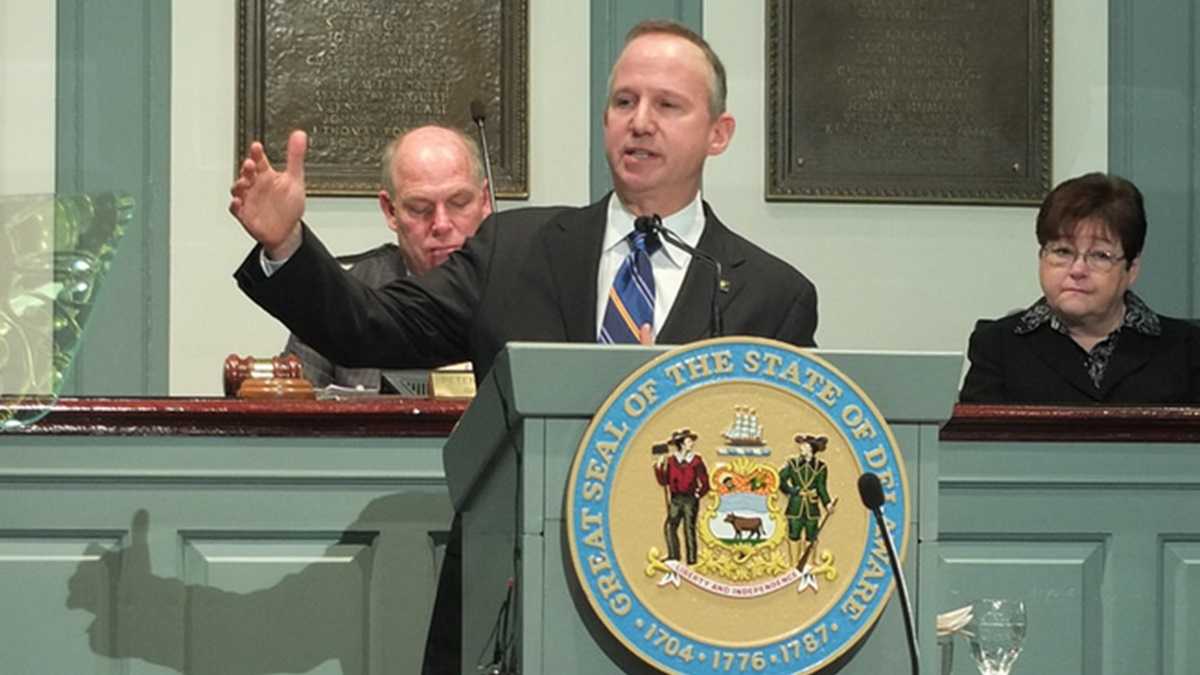Is Markell’s restraint an effective political strategy?

Gov. Jack Markell (file/NewsWorks)
One thing you can admire about Gov. Jack Markell is his ability to remain on an even keel.
With the clock ticking down on his second and final term, Markell may have been tempted to go after fellow Democrats who turned tail when it came to his ambitious proposals.
One proposal would have added a dime to the state gas tax; another, an increase to the gas tax based on cost-of-living increases. Markell also wanted to see a fee, averaging about $50 a year on a residential property tax bill, as part of a plan to clean up the state’s streams. Progress has been made in this area, but has come at a painfully slow pace.
Instead of seeking payback for these stalled initiatives, Markell took the high road as the less-than-spectacular session of the General Assembly ended in the wee hours of the first of July.
He praised legislators for dealing with issues such as workers compensation reform, tweaking the research and development tax credit to attract more small business investment and spending several million dollars on redevelopment of main streets in the state.
The stars were not aligned
As many legislative observers noted, the stars were not aligned in favor of bold action. It is election year, with some key Democrats facing contested races that include primary challengers.
At the same time, tax and fee receipts are not robust, a reflection of a slow recovery from the economic downturn and the lack of blue-collar jobs with decent paychecks. It’s a regional issue, with Virgina, a state with a robust economy, facing similar challenges.
That made it easy for legislators to wring their hands over the state of the economy and come up with a “duct tape” transportation funding plan that includes a toll increase on Delaware Route 1 and finding $10 million in relief for casinos struggling with increasingly intense competition.
The cliché of “kicking the can down the road” also applies. The casino industry, for example, will limp along with no signs of an upturn as a decision is postponed on returning the industry to lower tax rates.
One can argue that racetrack casinos were given monopoly status for a time, and unlike their counterparts in other states, did not pay up-front license fees. But that misstep is in the past and the reality is that hundreds, if not thousands, of jobs are now at stake.
For a governor looking at at what could be a disappointing legacy, the lack of any hint of boldness must be aggravating.
At the same time, Markell has the instincts of a start-up entrepreneur who is willing to push big ideas, but will quickly move on when things do not work out. After all, he was one of the original employees in Nextel at a time when the cell phone carrier did not always know where money would come for the next payroll.
Some might say these tendencies have been part of the problem. The governor, they argue, lacks an overall vision for the economy and jumps from project to project, a few examples being Fisker, Bloom Energy and, more recently. the dead-for-now Data Centers project.
A benign strategy
Granted, Markell was handed an economy that had seen loss of both auto plants and, for a time, the shutdown of a refinery. And we have to remember that the state has wasted time and money chasing down the next big thing.
Anyone remember the effort to bring the semiconductor industry to Delaware?
Markell also faced an increasingly liberal legislature, with few moderate Republicans that could form an alliance with centrist Democrats. Instead, we are seeing a more polarized General Assembly, where those on the left and right can form an alliance of sorts.
Those on the other end of the spectrum believed corporations should simply foot the bill on every expense that comes along.
That left a governor with centrist instincts with little room to maneuver.
Justifications for not dealing with the gas tax or stream quality issues included the belief on the right that cuts in spending and/or taxes could boost the economy. Also cited are states where the economy snapped back more rapidly. Most of these states were energy-rich or, like Michigan and Indiana, tied to a booming auto industry.
Markell will be back next year, perhaps with modified plans that begin to nibble away at the problems. By that time, the General Assembly may have more stomach for making tough decisions.
The governor, meanwhile, has made it easier on himself by not making any new enemies.
WHYY is your source for fact-based, in-depth journalism and information. As a nonprofit organization, we rely on financial support from readers like you. Please give today.




